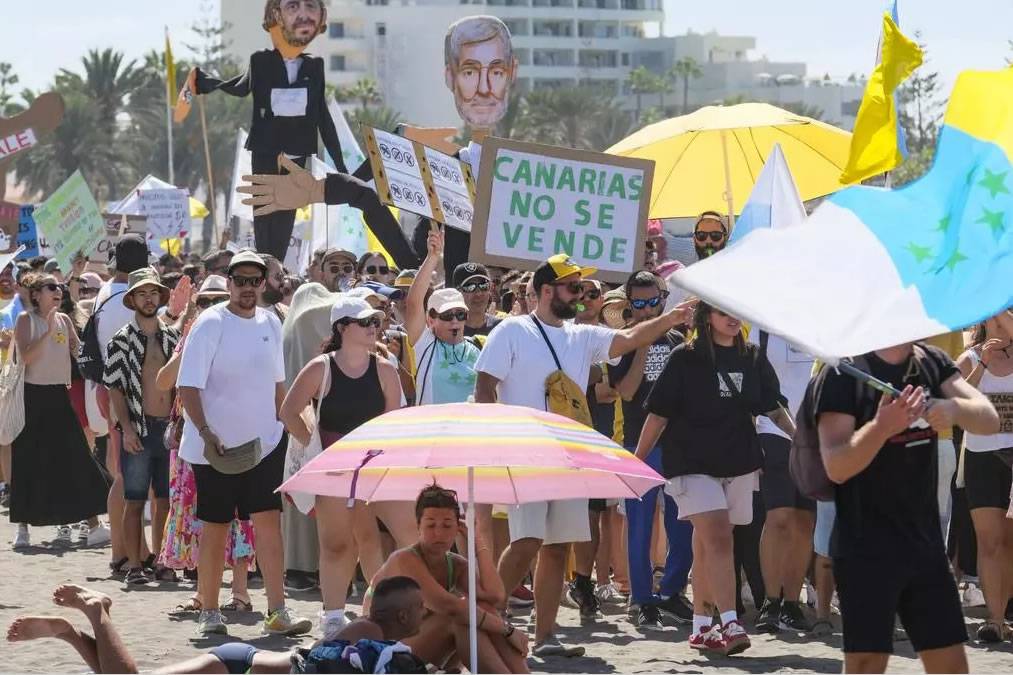Protestors believe government’s nervousness proves success of demonstrations in tourist areas
- 29-10-2024
- National
- Canarian Weekly
- Photo Credit: Stock Image
The organisers behind the demonstrations held on April 20th and October 20th against the Canary Islands' mass tourism model have declared their intent to continue protesting and advancing their proposals. Citing the evident nervousness and frustration exhibited by political and business leaders, they view their actions in the tourist hotspots as a strategic and effective move.
In a joint statement, the coordinators emphasised that this is merely the beginning of a sustained struggle aimed at achieving substantial and meaningful changes. “This is just the start of a fight that will continue until we see real and profound transformations,” they said, highlighting their organisation and cohesion as key factors that should concern local institutions.
The statement reviewed the October 20th protests, which called for an economic model shift “towards one that respects the islands and the people.” The coordinators praised the exemplary advocacy displayed by all participating groups and individuals across the islands, noting the significant impact these demonstrations had both locally and internationally.
“These demonstrations, held in the archipelago’s most iconic tourist areas, have highlighted the severity of the problem right in the spaces that suffer the most from mass tourism and the excessive exploitation of our natural resources,” they stated.
The coordinators pointed to the “nervous and angry” reactions from key officials, including Jessica de León, the Canarian Minister of Tourism; Fernando Clavijo, the President of the Canary Islands; and Onalia Bueno, the Mayor of Mogán. They interpreted these responses as validation of their strategy to target the heart of the tourism model, celebrating it as a successful approach.
The protests have unsettled the tourism board, forcing a re-examination of the future of the current tourism model, according to the organisers. They also attributed the officials' nervousness to the “clear manipulation by certain media funded by the tourism lobby, which sees its profits threatened.”
Looking ahead, the coordinators foresee that changing the tourism model “will come through constant struggle.” They asserted that an organised populace is the most effective tool against threats such as environmental degradation, gentrification, precarious living conditions, and the overexploitation of the territory.
“We are not just protesting,” they emphasised, “but also presenting clear proposals that the Government of the Canary Islands, the island cabildos, and the local councils have ignored.” The demonstrations have sparked a broader debate about the tourism model while fostering ongoing organization and coordination among groups across all the islands.
“This organisation and cohesion should be one of the top concerns for institutions. We are organised and we are not going to stop,” the coordinators concluded.
As the movement gains momentum, local authorities are under increasing pressure to address the underlying issues related to mass tourism and implement the proposed changes to ensure the sustainable and respectful development of the Canary Islands.
Should I cancel my holiday?
On the reverse side of these protests, is the negative effect it is having on holidaymakers themselves. The UK media are sensationalising the protests and making it look as though tourists are not welcome and it is unsafe for them to come to the islands.
This is completely untrue as it has been made clear that the argument is with the government and not tourists. Here at the Canarian Weekly, we have had hundreds of emails and messages asking if it is safe to come or whether people should cancel their holidays.
Ultimately it is a personal decision, however, there has only been two days of peaceful protests this year, and currently no date set for future ones, so why would you?
Other articles that may interest you...
Trending
Most Read Articles
Featured Videos
TributoFest: Michael Buble promo 14.02.2026
- 30-01-2026
TEAs 2025 Highlights
- 17-11-2025



























































